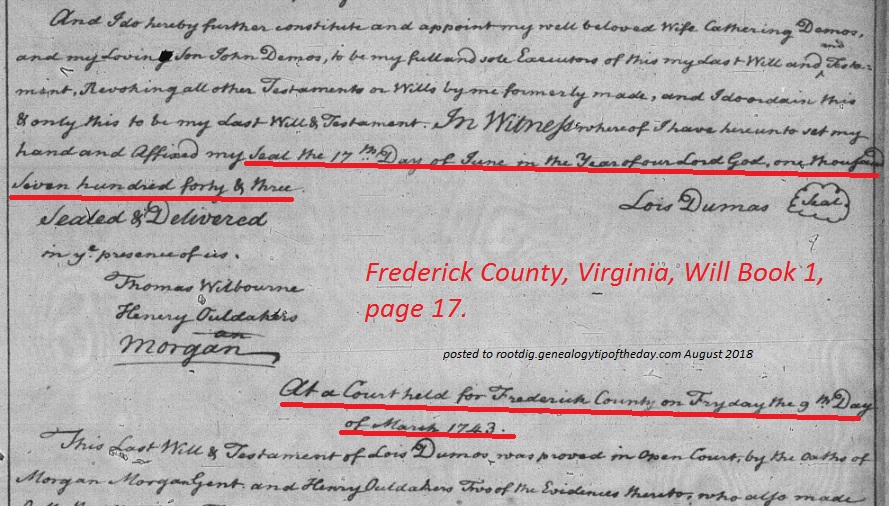
The will of Louis DeMoss indicated that it was signed by DeMoss on 17 June 1743 and admitted to probate on 9 March 1743. One might be tempted to think that something is amiss. After all, the copy of Louis’ will that is extant is the record copy–recorded in Frederick County, Virginia’s Will Book 1, pages 16 and 17. Clerks can and do make errors and the copy to which we have access is a derivative copy of the original record.
The prime directive of the clerk entering documents in the record book was to copy it exactly as it was written. One hopes that any notations about proving the will and recording it are done correctly. Wills are recorded in the order to which they are admitted to probate, not the order in which they are signed by the testators. The notations for the will recorded immediately preceding the DeMoss will should indicate an admission to probate of 9 March 1743 or earlier and the notations for the will immediately following it should indicate an admission date of 9 March 1743 or after.
They do. Nothing appears amiss.
Did the clerk make a mistake in copying down he date the will was signed by DeMoss?
Possibly. But like most things that are possible, there’s probably another explanation. And it has to do with dating.
In the 1740s, the year began on 25 March–not 1 January. Contrary to popular belief, the start of the “new year” was not always on 1 January. So when Louis’s will was written on 17 June 1743, the year 1743 continued until 24 March. While it may seem strange, 31 December 1743 was followed by 1 January 1743 and so the days rolled on. Louis wrote his will in June and early in the following March, it was admitted to probate–on 9 March. And that was still in 1743.
The year would not change until 25 March–and then it was 1744. There’s not an error with the dates on Louis’ will. It is our unfamiliarity with the contemporary calendar than could lead to the misunderstanding.
Which is why it is always good follow the prime directive of the county clerk and copy things as they are written.
And then try and figure out if there’s a mistake. Sometimes there are mistakes. And sometimes there are not. It’s up to the researcher to try and discern the difference.
Take things solely–one year at a time.
And remember that today 31 December 2018 will be followed by 1 January 2019. But in 1743, 31 December 1743 was followed by 1 January 1743. They days wore on until 24 March 1743 and that was followed by 25 March 1744.
There’s more details about the calendar and how it relates to the US colonial era on this website. We’ll be transcribing and discussing the will in detail in an upcoming issue of Casefile Clues.

One response
I ran across dates like this a few years ago, the last digit of the year was written as a fraction (it may have been a SAR/DAR application). I did not know how to interpret that information. This must be the answer. I wish I had flagged the document so I could look at it again.